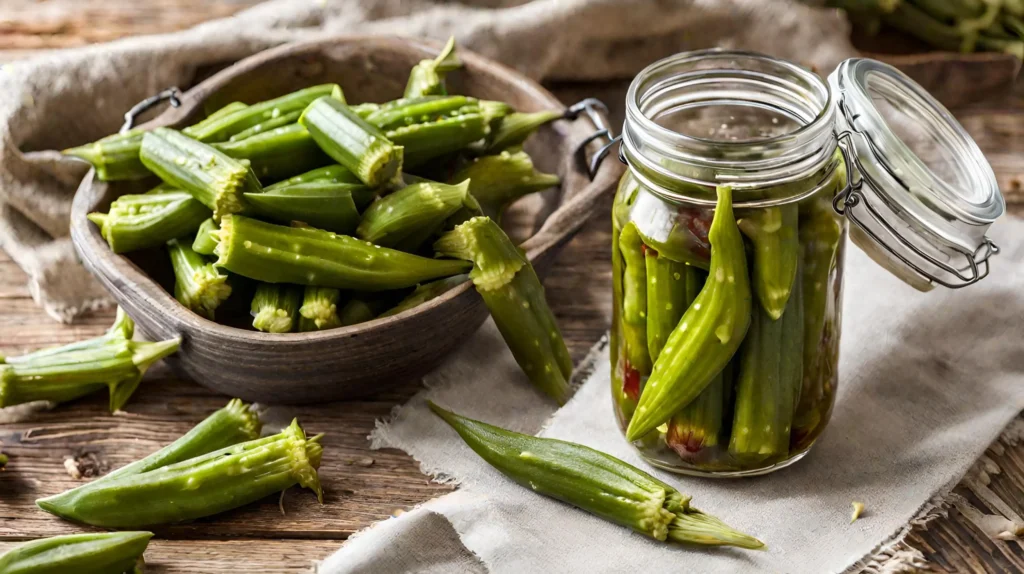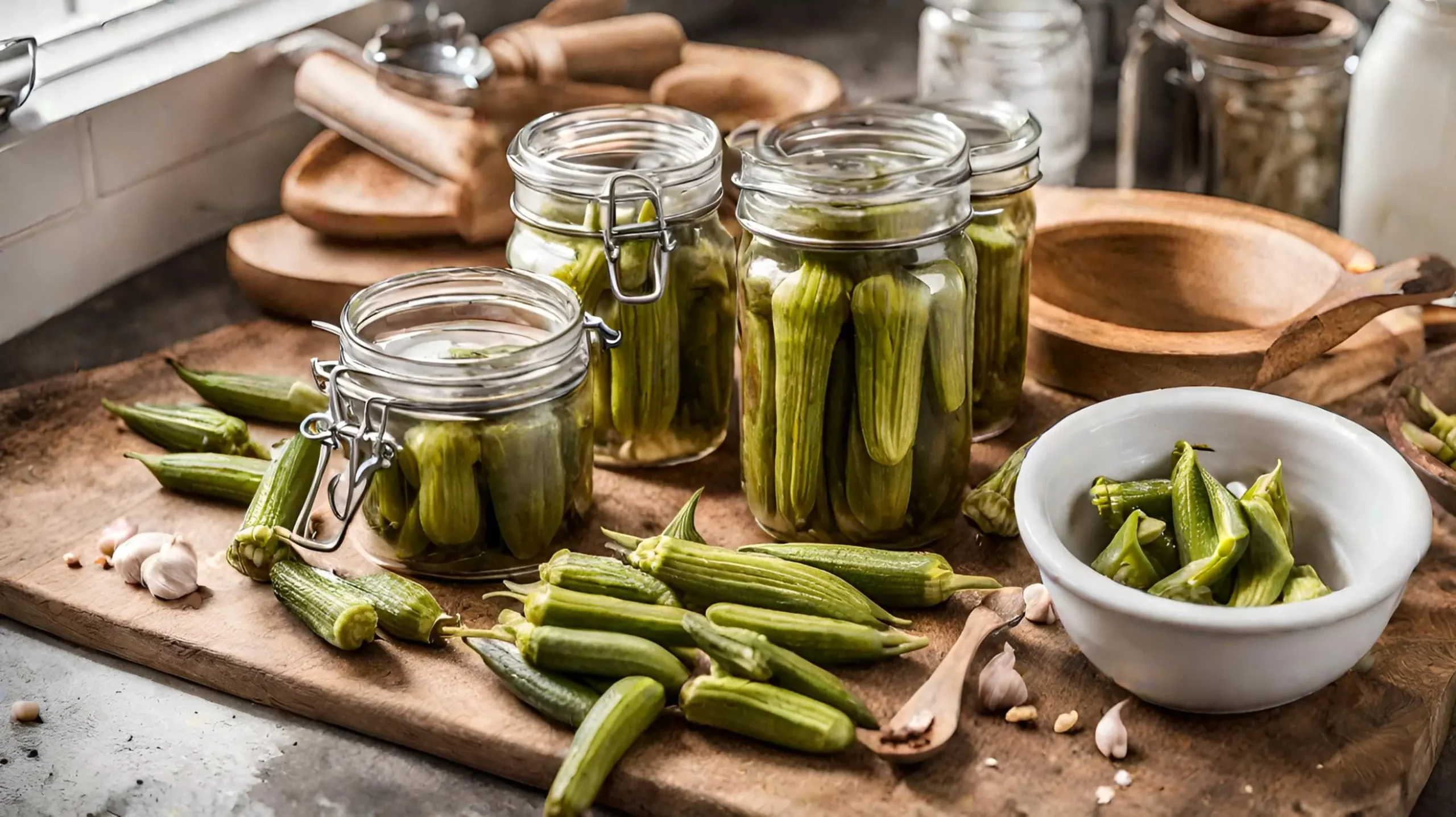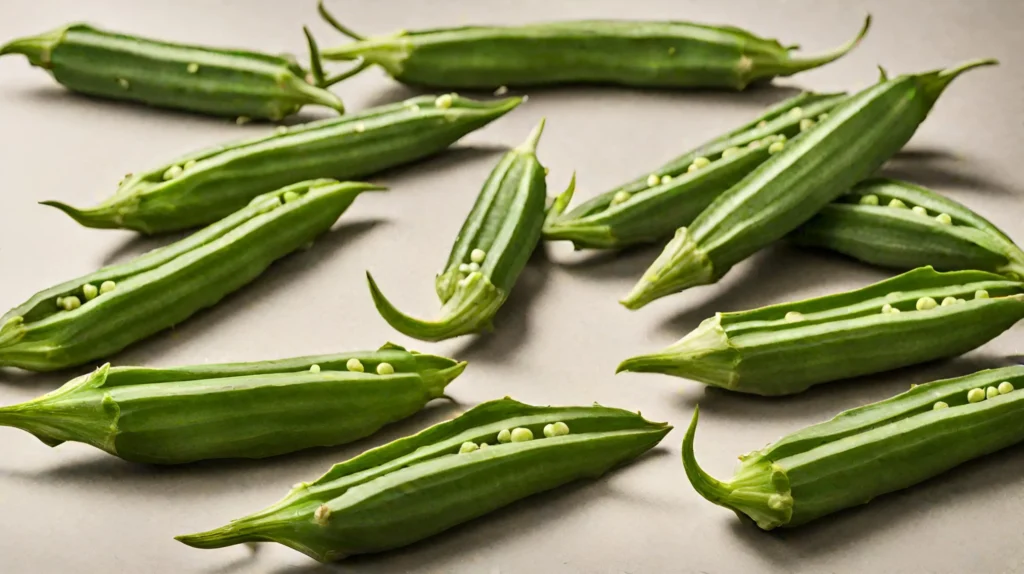Pickled okra, a delightful and tangy treat, has been gaining popularity in culinary circles for its unique flavor and versatility. This article aims to provide a comprehensive guide to making quick pickled okra recipe, ensuring that even beginners can create this delicious condiment with ease.
Understanding Okra
History and Origin of Okra
Okra, known for its edible green seed pods, has a rich history that spans continents. Originally from Africa, okra traveled to the Americas and Europe, becoming a staple in various cuisines. Its adaptability to different climates and soils contributed to its widespread cultivation.
Nutritional Benefits of Okra
Okra is not only delicious but also packed with nutrients. It’s a low-calorie vegetable rich in vitamins A and C, fiber, and antioxidants. These nutrients contribute to improved digestion, vision health, and overall immune function.
Why Pickling Okra is a Great Idea
Pickling okra enhances its flavor and extends its shelf life. The process of pickling introduces beneficial bacteria, which aids in digestion. Moreover, pickled okra can be a versatile addition to your diet, serving as a snack, a side dish, or a flavorful ingredient in various recipes.
Preparing for the Pickling Process
Selecting the Right Okra
Choosing the best okra is crucial for a successful pickling experience. Here are some tips to ensure you get the freshest and most suitable okra for pickling:
- Look for young, tender okra pods that are bright green and firm to the touch.
- Avoid pods that are too large or have brown spots, as they might be tough and fibrous.
- Freshness is key, so opt for okra that looks crisp and not wilted.
Selecting Ingredients for Your Quick Pickled Okra
The right ingredients are essential for creating that perfect batch of quick pickled okra. Here’s what you’ll need:
- Vinegar: White vinegar is commonly used for its clear color and strong acidity. Apple cider vinegar is also a great option for a slightly fruity tang.
- Salt: Pickling or kosher salt is preferred as it doesn’t contain anti-caking agents that can cloud the brine.
- Spices: Classic spices include garlic, dill, mustard seeds, and peppercorns. Feel free to experiment with other spices based on your preference.
- Sugar or Honey: A bit of sweetness balances the acidity of the vinegar. This is optional and can be adjusted to taste.
- Water: Used to dilute the vinegar to a palatable acidity.
Equipment Needed
Having the right equipment will make the pickling process smoother and more enjoyable:
- Jars: Clean, airtight jars are essential for storing your pickled okra. Mason jars are a popular choice.
- Large Pot: For preparing the pickling brine.
- Colander and Knife: For cleaning and preparing the okra.
- Measuring Cups and Spoons: For accurate measurement of ingredients.
With the right ingredients and equipment at hand, you’re now ready to start the exciting process of making your own quick pickled okra. Stay tuned for the upcoming sections where we’ll walk
The Quick Pickled Okra Recipe
Creating your own quick pickled okra is a rewarding and flavorful endeavor. Here’s a detailed guide to help you through each step of the process.
Quick Pickled Okra Recipe: A Step-by-Step Guide
- Prepare the Okra:
- Wash the okra pods thoroughly under cold water.
- Trim the stem ends, being careful not to cut into the pod itself, as this can release more slime.
- For a visual and textural variety, you can leave some pods whole and slice others lengthwise.
- Prepare the Brine:
- In a large pot, combine 2 cups of water, 2 cups of vinegar, and 2-3 tablespoons of salt.
- Add your choice of spices. Common options include garlic cloves, dill seeds, mustard seeds, and a few peppercorns.
- Bring the mixture to a boil, then lower the heat and let it simmer for a few minutes to infuse the flavors.
- Pack the Jars:
- Place the prepared okra into clean, sterilized jars.
- You can pack them tightly as they will shrink slightly during the pickling process.
- Add the Brine:
- Carefully pour the hot brine over the okra in the jars, ensuring that the pods are completely submerged.
- Leave about a half-inch of headspace at the top of each jar.
- Seal and Cool:
- Seal the jars tightly with their lids.
- Let them cool to room temperature before refrigerating.
- Refrigerate:
- Store the jars in the refrigerator.
- The okra will start to pick up the flavors within a day, but for best results, wait at least a week before consuming.
Variations and Customizations of Quick Pickled Okra Recipe
- Spice Level: Adjust the heat by adding sliced jalapeños or red pepper flakes to the brine.
- Sweetness: For a sweeter pickle, add a small amount of sugar or honey to the brine.
- Herbs: Experiment with different herbs like basil, thyme, or oregano for unique flavor profiles.
- Vinegar Type: Try different types of vinegar like apple cider or red wine vinegar for varying acidity and taste.
This recipe is just a starting point. Feel free to experiment and adjust the ingredients to suit your taste preferences. In the next sections, we’ll explore creative ways to serve your quick pickled okra and the best practices for storing them.
Serving and Storage
Once you’ve mastered the art of making quick pickled okra, the next exciting steps are serving and storing them. Here’s how you can make the most out of your delicious creation.
Creative Ways to Serve Pickled Okra
- As a Standalone Snack: Enjoy the pickled okra straight out of the jar for a tangy, crunchy treat.
- In Salads: Slice the pickled okra and add it to your salads for an extra zing.
- With Cheese Boards: Pair it with a variety of cheeses, crackers, and meats for a delightful appetizer.
- In Sandwiches and Wraps: Add a unique flavor and crunch to your sandwiches and wraps.
- As a Cocktail Garnish: Use a skewer of pickled okra to garnish a Bloody Mary or a martini.
- In Cooked Dishes: Chop and add them to stews, gumbos, or casseroles for an acidic kick.
Proper Storage Techniques
- Refrigeration: Store your pickled okra in the refrigerator. Ensure the jars are sealed tightly.
- Shelf Life: When stored properly, quick pickled okra can last for 2-3 months in the refrigerator.
- Avoid Cross-Contamination: Always use clean utensils when taking okra out of the jar to extend its shelf life.
- Check for Signs of Spoilage: Before consuming, check for any signs of spoilage like off odors, mold, or unusually soft texture.
The Science of Pickling Okra
Understanding the Pickling Process
Pickling is a fascinating culinary science that involves preserving food through anaerobic fermentation in brine or immersion in vinegar. In the case of okra, the pickling process not only extends its shelf life but also transforms its texture and flavor. The acidic environment created by vinegar or a saltwater brine prevents the growth of harmful bacteria, making pickled okra safe and delicious to eat.
The Role of Vinegar and Salt in Pickling
Vinegar and salt are crucial in the pickling process. Vinegar, with its acetic acid, acts as a preservative and flavoring agent. It gives pickled okra its characteristic tangy taste. Salt, on the other hand, draws out moisture from the okra, aiding in the preservation process. It also plays a vital role in flavor development. The concentration of vinegar and salt can vary depending on the recipe, but the balance is key to achieving the perfect pickled okra.

Health Benefits and Dietary Considerations
Health Benefits of Pickled Okra
Pickled okra is not just a tasty addition to your meals; it also offers several health benefits. Rich in vitamins A and C, it provides essential nutrients that support immune function and skin health. The fiber content in okra aids in digestion and helps maintain a healthy gut. Additionally, the pickling process introduces probiotics, beneficial bacteria that promote a healthy digestive system. These probiotics can enhance gut flora, contributing to overall gastrointestinal health.
Dietary Considerations
While pickled okra is a healthy choice for many, it’s important to consider certain dietary aspects:
- Sodium Content: Pickled okra contains salt, which contributes to its sodium content. Those with hypertension or on a low-sodium diet should consume it in moderation.
- Acidity: The vinegar used in pickling is acidic, which might be a concern for individuals with acid reflux or stomach ulcers. It’s advisable for such individuals to consume pickled okra in limited quantities.
- Allergies and Sensitivities: As with any food, some individuals might be allergic or sensitive to specific ingredients used in pickling okra, such as certain spices or vinegar. It’s important to be aware of these ingredients if you have known food allergies or sensitivities.
Pairing Pickled Okra with Meals
Complementary Flavors and Dishes
Pickled okra, with its unique tangy and slightly spicy flavor, can enhance a variety of dishes. Its versatility allows it to pair well with several cuisines:
- Southern Comfort Food: Traditionally, pickled okra is a staple in Southern cuisine. It pairs wonderfully with dishes like fried chicken, barbecue, and cornbread.
- Mediterranean Dishes: The tanginess of pickled okra complements Mediterranean flavors. Try adding it to Greek salads, mezze platters, or alongside hummus and pita bread.
- Asian Cuisine: Its crisp texture and vinegary bite make it a great side for Asian dishes, particularly with rice and noodle dishes that have rich, savory flavors.
Creative Recipe Ideas
Incorporating pickled okra into your recipes can add an exciting twist to everyday meals:
- Salads: Chop pickled okra and add it to your salads for a zesty flavor.
- Sandwiches and Wraps: Use pickled okra as a crunchy, flavorful addition to sandwiches and wraps, much like you would use pickles or cucumbers.
- Charcuterie Boards: Include pickled okra on charcuterie or cheese boards for a unique and tasty option.
- Cocktails: For a Southern twist, garnish a Bloody Mary or other savory cocktails with a spear of pickled okra.
Preserving and Canning Techniques
Long-Term Preservation Methods
For those who love pickled okra and wish to enjoy it year-round, understanding proper preserving and canning techniques is essential. Here’s how you can preserve your pickled okra for long-term use:
- Water Bath Canning: This method involves placing your jars of pickled okra in boiling water for a specific amount of time. It’s crucial to follow safe canning practices to prevent the growth of bacteria, especially botulism.
- Pressure Canning: For those at higher altitudes or looking for an extra level of safety, pressure canning is an alternative. This method uses higher temperatures to ensure the destruction of bacteria spores.
Safety Tips for Home Canning
Home canning is a rewarding process but requires careful attention to safety:
- Sterilize Your Jars and Lids: Before canning, ensure all jars and lids are sterilized to kill any harmful bacteria.
- Use the Right Equipment: Invest in a quality canner and follow the manufacturer’s instructions.
- Check Seals: After canning, check that the jars have sealed properly. A good seal is crucial for preventing contamination and spoilage.
- Store Properly: Store your canned pickled okra in a cool, dark place. Once opened, refrigerate and consume within a reasonable time frame.
FAQs Of Quick Pickled Okra Recipe
we address some of the most common questions about quick pickled okra, providing insights and tips to enhance your pickling experience.
How long does pickled okra have to sit before you can eat it?
Quick pickled okra typically needs to sit for at least 48 hours to fully develop its flavors. However, for optimal taste, a week is often recommended.
Why is my pickled okra mushy?
Mushiness in pickled okra can result from overcooking the okra before pickling or using okra that is not fresh. Ensuring the use of crisp, fresh okra and minimizing cooking time can help maintain the desired texture.
Is homemade pickled okra good for you?
Yes, homemade pickled okra is healthy. It retains most of the nutritional benefits of fresh okra, such as fiber, vitamins, and antioxidants, while the pickling process adds probiotics that are beneficial for gut health.
Can you freeze okra and then pickle them?
Freezing okra before pickling is not recommended as it can alter the texture, leading to a less crisp final product. For the best results, use fresh okra for pickling.
Conclusion
Throughout this comprehensive guide, we’ve journeyed through the delightful and diverse world of quick pickled okra recipe. From understanding the basics of okra and the pickling process to exploring advanced preserving techniques and global pickling traditions, this guide has aimed to provide a thorough insight into every aspect of pickling okra.We’ve delved into the health benefits, dietary considerations, and the cultural significance of pickling, highlighting how this simple process can bridge culinary traditions and bring people together. The versatility of pickled okra in various cuisines and its role in enhancing flavors in everyday meals have been explored, offering readers a multitude of ways to incorporate this tangy treat into their diets.As we conclude, it’s clear that pickled okra is more than just a condiment; it’s a testament to the rich tapestry of food preservation techniques that have been passed down through generations. Whether you’re a seasoned home cook or a curious beginner, the world of pickling okra offers endless possibilities for exploration and enjoyment.We encourage you to use this guide as a starting point for your pickling adventures, experimenting with flavors, techniques, and recipes to create your unique pickled delights. Happy pickling!


